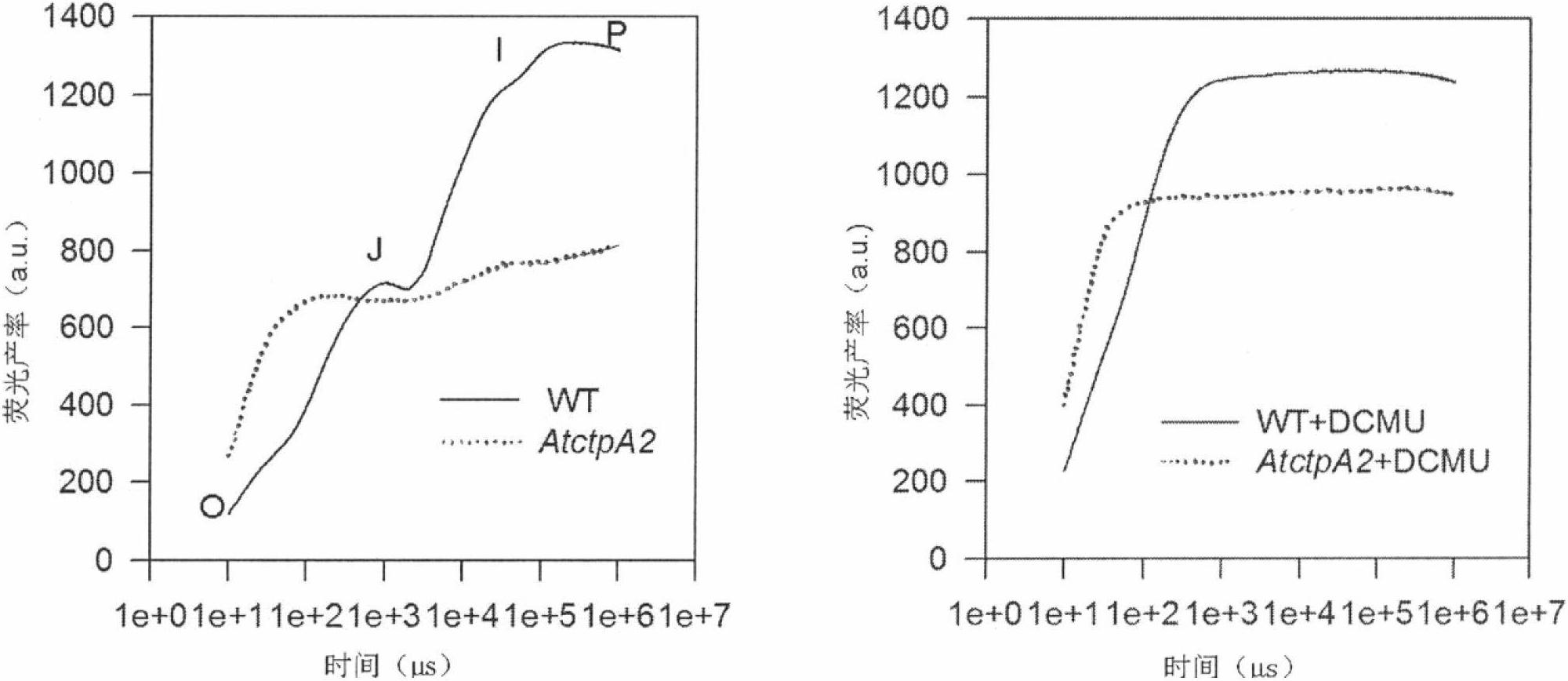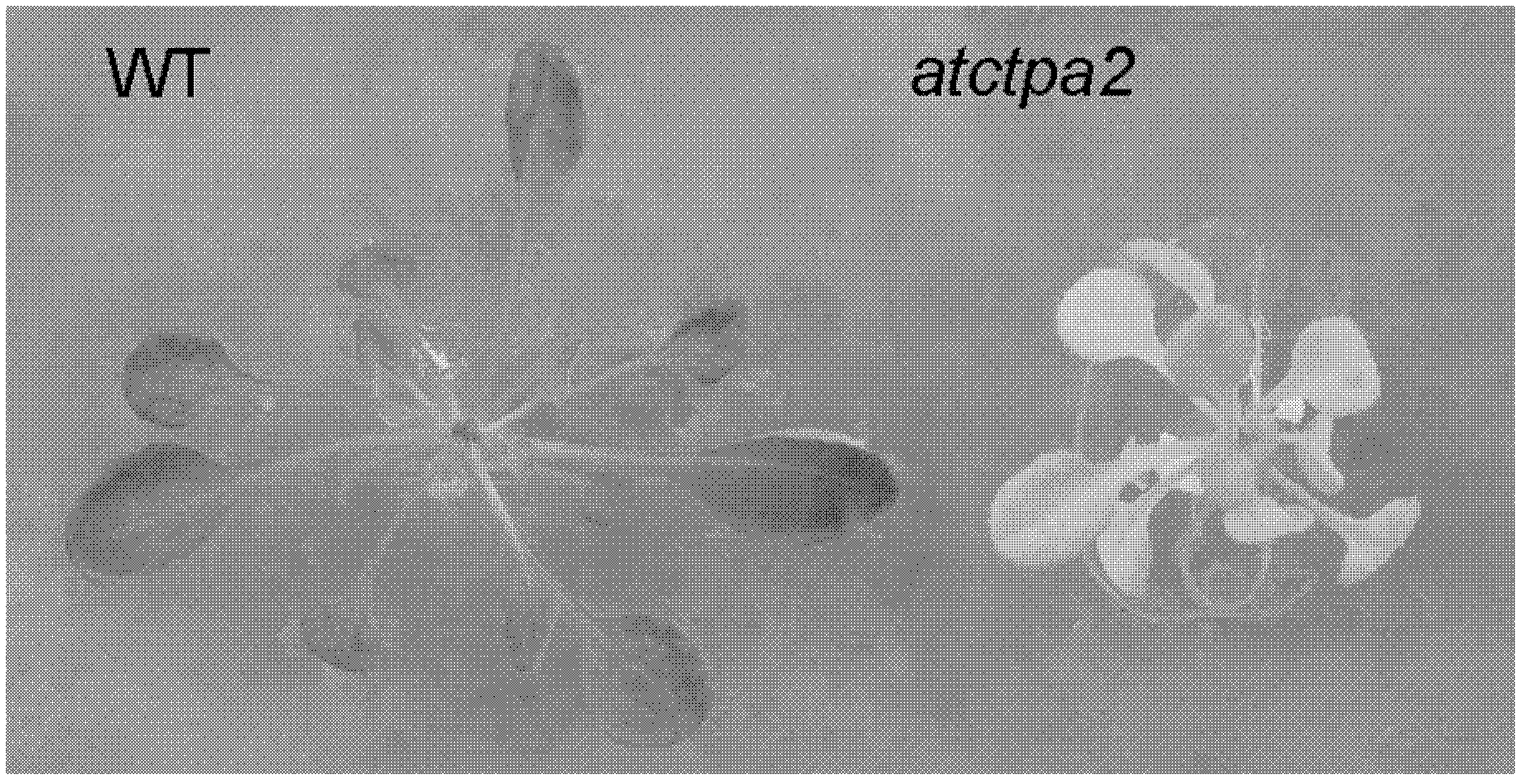Application of protein ATCTPA2 related to photosynthesis
A protein and protein technology, applied in the biological field, can solve problems such as the absence of Arabidopsis CtpA enzyme reports
- Summary
- Abstract
- Description
- Claims
- Application Information
AI Technical Summary
Problems solved by technology
Method used
Image
Examples
Embodiment 1
[0041] Example 1. Discovery process of gene function
[0042] 1. Identification of mutant materials
[0043] The mutant homozygote (salk_056011) of the T-DNA insertion of the nuclear coding gene At4g17740 located in the chloroplast was purchased from ABRC (Arabidopsis Biological Resource Center) in the United States. The gene encoding CtpA was named AtctpA2, and the encoded protein was named ATCTPA2.
[0044] T-DNA insertion mutant homozygotes and wild-type Arabidopsis (ordered from ABRC library, Col-0 type) were grown on MS medium with a growth light intensity of 40 ± 5 μmol m -2 ·s -1 , the result is figure 1 As shown, wild-type Arabidopsis thaliana (WT) on the left and mutant homozygotes with T-DNA insertion (AtctpA2) on the right, it was found that the cotyledons of the mutant homozygotes with T-DNA insertion were yellowed compared to wild-type Arabidopsis thaliana , true leaves light green, plant dwarf.
[0045] Two weeks later, the mutant homozygotes with T-DNA ins...
Embodiment 2
[0061] Example 2. Transgenic complementation experiment
[0062] 1. Acquisition of atctpa2 gene
[0063] The nucleotide sequence of the atctpa2 gene is sequence 1 in the sequence table. The primers were designed according to the sequence between 1 and 1545bp, and were expanded from the genome of Arabidopsis thaliana (Col-0 ecotype, purchased from the Arabidopsis Biological Resource Center). Gene. The primers used are as follows: Former: 5'CATG CCATGG AGGTCCTTGCGAGCT 3', Reverse: 5' GA AGATCT TCATCTAGAAAAAAGTAGGCCTTGA 3'. The amplified product was purified by cutting gel and then ligated to pEASY-T3 vector.
[0064] It was transformed into Escherichia coli DH5α, and positive clones were screened for PCR, restriction digestion and sequencing identification. The sequencing results show that its nucleotide sequence is the 1-1545th nucleotide from the 5' end of sequence 1 in the sequence listing, named atctpa2, which can encode the protein shown in sequence 2, and the protei...
PUM
 Login to View More
Login to View More Abstract
Description
Claims
Application Information
 Login to View More
Login to View More - R&D
- Intellectual Property
- Life Sciences
- Materials
- Tech Scout
- Unparalleled Data Quality
- Higher Quality Content
- 60% Fewer Hallucinations
Browse by: Latest US Patents, China's latest patents, Technical Efficacy Thesaurus, Application Domain, Technology Topic, Popular Technical Reports.
© 2025 PatSnap. All rights reserved.Legal|Privacy policy|Modern Slavery Act Transparency Statement|Sitemap|About US| Contact US: help@patsnap.com



